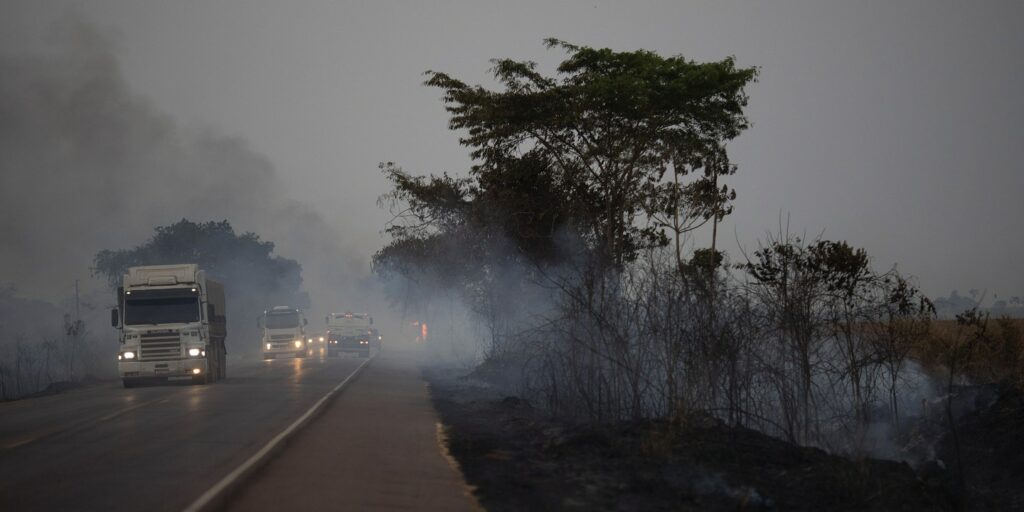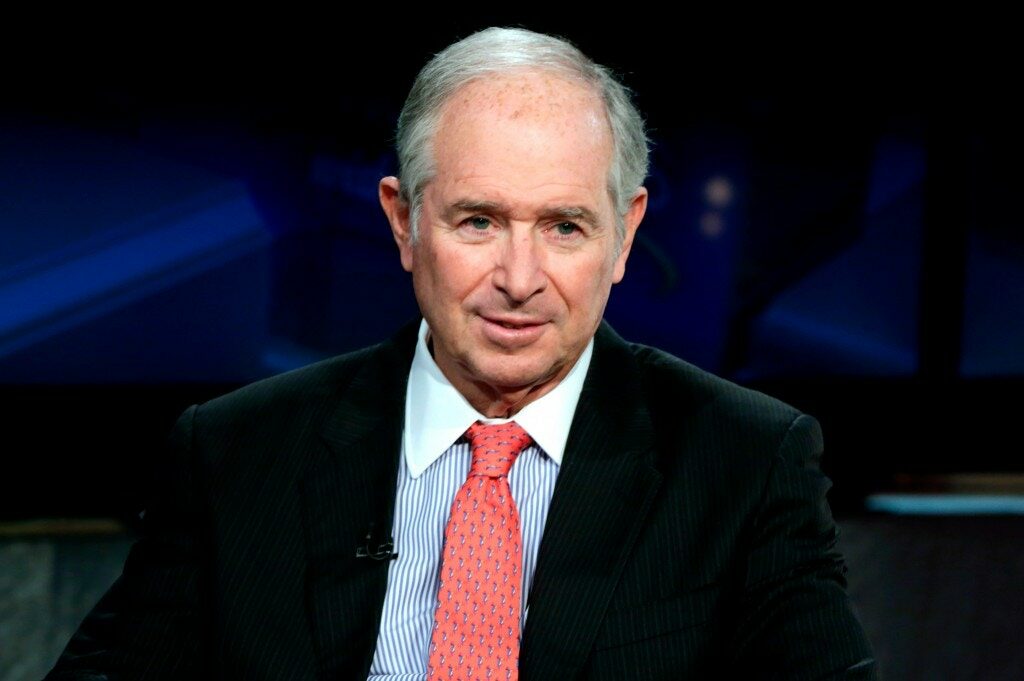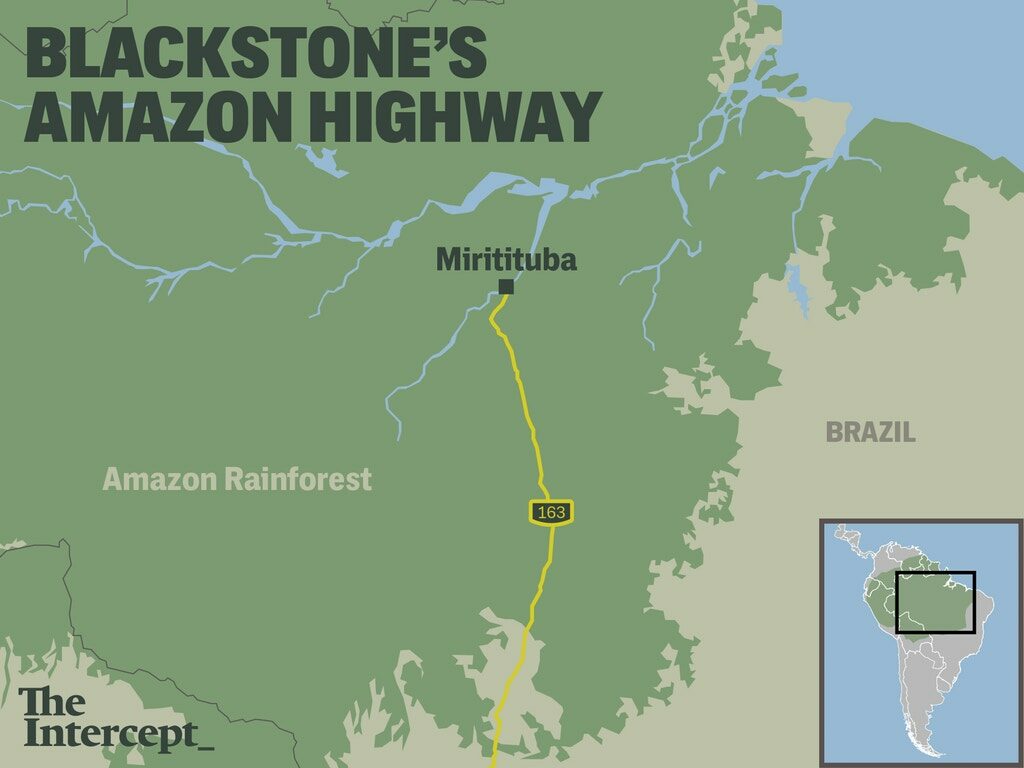A Top Financier of Trump and McConnell Is a Driving Force behind Amazon Deforestation
ENVIRONMENT, ANGLO AMERICA, BRICS, LATIN AMERICA AND THE CARIBBEAN, EXPOSURES - EXPOSÉS, CAPITALISM, ECONOMICS, 2 Sep 2019

Trucks drive alongside scorched fields on the BR-163 highway in the state of Mato Grosso, Brazil, on Aug. 23, 2019. Photo: Leo Correa/AP
27 Aug 2019 – Two Brazilian firms owned by a top donor to President Donald Trump and Senate Majority Leader Mitch McConnell are significantly responsible for the ongoing destruction of the Amazon rainforest, carnage that has developed into raging fires that have captivated global attention.
The companies have wrested control of land, deforested it, and helped build a controversial highway to their new terminal in the one-time jungle, all to facilitate the cultivation and export of grain and soybeans. The shipping terminal at Miritituba, deep in the Amazon in the Brazilian state of Pará, allows growers to load soybeans on barges, which will then sail to a larger port before the cargo is shipped around the world.
The Amazon terminal is run by Hidrovias do Brasil, a company that is owned in large part by Blackstone, a major U.S. investment firm. Another Blackstone company, Pátria Investimentos, owns more than 50 percent of Hidrovias, while Blackstone itself directly owns an additional roughly 10 percent stake. Blackstone co-founder and CEO Stephen Schwarzman is a close ally of Trump and has donated millions of dollars to McConnell in recent years.
“Blackstone is committed to responsible environmental stewardship,” the company said in a statement. “This focus and dedication is embedded in every investment decision we make and guides how we conduct ourselves as operators. In this instance, while we do not have operating control, we know the company has made a significant reduction in overall carbon emissions through lower congestion and allowed the more efficient flow of agricultural goods by Brazilian farmers.”
The port and the highway have been deeply controversial in Brazil, and were subjects of a 2016 investigation by The Intercept Brasil. Hidrovias announced in early 2016 that it would soon begin exporting soybeans trucked from the state of Mato Grosso along the B.R.-163 highway. The road was largely unpaved at the time, but the company said it planned to continue improving and developing it. In the spring of 2019, the government of Jair Bolsonaro, elected in fall 2018, announced that Hidrovias would partner in the privatization and development of hundreds of miles of the B.R.-163. Developing the roadway itself causes deforestation, but, more importantly, it helps make possible the broader transformation of the Amazon from jungle to farmland.
The roadway, B.R. 163, has had a marked effect on deforestation. After the devastation that began under the military dictatorship and accelerated through the 1970s and ’80s, the rate of deforestation slowed, as a coalition of Indigenous communities and other advocates of sustaining the forest fought back against the encroachment. The progress began turning back in 2014, as political tides shifted right and global commodity prices climbed. Deforestation began to truly spike again after the soft coup that ousted President Dilma Rousseff of the Workers’ Party in 2016. The right-wing government that seized power named soy mogul Blairo Maggi, a former governor of Mato Grosso, as minister of agriculture.
Yet even as deforestation had been slowing prior to the coup, the area around the highway was being destroyed. “Every year between 2004 and 2013 — except 2005 — while deforestation in Amazonia as a whole fell, it increased in the region around the B.R.-163,” the Financial Times reported in September 2017. That sparked pushback from Indigenous defenders of the Amazon. In March, Hidrovias admitted that its business had been slowed by increasing blockades on B.R. 163, as people put their bodies in front of the destruction. Still, the company is pushing forward. Hidrovios recently said that, thanks to heavy investment, it planned to double its grain shipping capacity to 13 million tons.
The Amazon, where a record number of fires have been raging, is the world’s largest rainforest. It absorbs a significant amount of carbon dioxide, a major contributor to the climate crisis. The Amazon is so dense in vegetation that it produces something like a fifth of the world’s oxygen supply. The moisture that evaporates from the Amazon is important form farmlands not just in South America, but also in the U.S. Midwest, where it falls to the earth as rain. Protection of the Amazon, 60 percent of which is in Brazil, is crucial to the continued existence of civilization as we know it.
The effort to transform the Amazon from a rainforest into a source of agribusiness revenue is central to the conflict, and linked to the fires raging out of control today. The leading edge of the invasion of the jungle is being cut by grileiros, or “land-grabbers,” who operate outside the law with chainsaws. The grileiros then sell the newly cleared land to agribusiness concerns, whose harvest is driven on the highway to the terminal, before being exported. Bolsonaro has long called for the Amazon to be turned over to agribusiness, and has rapidly defanged agencies responsible for protecting it, and empowered agribusiness leaders intent on clearing the forest. The land-grabbers have become emboldened.
“With Bolsonaro, the invasions are worse and will continue to get worse,” Francisco Umanari, a 42-year-old Apurinã chief, told Alexander Zaitchik, for a recent story in The Intercept. “His project for the Amazon is agribusiness. Unless he is stopped, he’ll run over our rights and allow a giant invasion of the forest. The land grabs are not new, but it’s become a question of life and death.”
Fires in the Amazon have been producing devastation described as unprecedented, many of them lit by farmers and others looking to clear land for cultivation or grazing. Bolsonaro initially dismissed the fires as unworthy of serious attention. Several weeks ago, Bolsonaro fired a chief government scientist for a report on the rapid escalation of deforestation under Bolsonaro’s administration, claiming that the numbers were fabricated.
Beginning with the military dictatorship in Brazil, when agribusiness was fully empowered, roughly a fifth of the jungle was destroyed by the mid-2000s. If the Amazon loses another fifth of its mass, it is at risk of a phenomenon known as dieback, where the forest becomes so dry that a vicious, cascading cycle takes over, and it becomes, as Zaitchik writes, “beyond the reach of any subsequent human intervention or regret.”

Blackstone Group CEO Steve Schwarzman is interviewed on the Fox Business Network on April 27, 2018.
Photo: Richard Drew/AP
Schwarzman, a founder of Blackstone, owns roughly a fifth of the company, making him one of the world’s richest men. In 2018, he was paid at least $568 million, which was, in fact, a drop from the $786 million he made the year before. He has been generous toward McConnell and Trump with that wealth. In 2016, he gave $2.5 million to the Senate Leadership Fund, McConnell’s Super PAC and put Jim Breyer, McConnell’s billionaire brother-in-law, on the board of Blackstone. Two years later, Schwarzman kicked in $8 million to McConnell’s Super PAC.
Blackstone employees have given well over $10 million to McConnell and his Super PAC over the years, making them the biggest source of direct financing over McConnell’s career. McConnell’s Senate campaign declined to comment.
Schwarzman is a close friend and adviser to Trump, and served as the chair of his Strategic and Policy Forum until it fell apart in the wake of the Charlottesville neo-Nazi rally, in which Trump famously praised “very fine people, on both sides.” In December 2017, as the final details of the GOP tax cut were being ironed out, Schwarzman hosted a $100,000-a-plate fundraiser for Trump. Some of the president’s dinner companions complained about the tax bill, and days later, Trump slashed the top percentage rate in the final package from 39.6 to 37.
In recent months, the Sackler family, whose members founded and own the pharmaceutical company Purdue Pharma, have become pariahs for their role in facilitating the opioid crisis and the deaths of tens of thousands of people. Schwarzman’s contributions to the destruction of the Amazon, which stands between humanity and an uninhabitable planet, may ultimately render him as socially untouchable as the Sacklers, given the scale of the fallout from the destruction of the rainforest.
In defense of the project, a Blackstone spokesperson noted that it had been approved by the International Finance Corporation, an affiliate of the World Bank, and that the IFC had determined that the project would, in fact, reduce carbon emissions. Blackstone also forwarded a statement that it credited to Hidrovias, which also emphasized the support of the IFC:
Hidrovias has always worked within the highest Environmental, Social and Governance (“ESG”) standards, constantly evaluated by audits from international multilateral agencies, such as the World Bank – IFC (International Finance Corporation). In addition, Hidrovias maintains all the environmental licenses required by the competent authorities.
The IFC has financed some of the world’s most environmentally destructive projects, so its endorsement in itself is not particularly persuasive. But even on its own terms, the IFC’s study of the Blackstone project calls the project’s sustainability into question. Transporting soy or grain by waterway is indeed a less carbon-intensive method of transport, the IFC correctly noted in its report. But, it went on, that assessment doesn’t take into account the reality that “the construction of the Miritituba port, close to still-intact areas of the Amazon forest, is likely to lower transport costs for farmers and thereby accelerate conversion of natural habitats into agricultural areas, particularly for soy production.”
The project is OK, the bank argued, because Hidrovias and its clients can be trusted to be responsible, and that “the Miritituba port is being purpose-built to handle soy traded only by responsible traders who are sensitive to the preservation of natural habitats.” The bank assured that “100% of the company’s transport capacity in the North System is contracted to large trading companies, which observe high levels of governance and abide by the Amazon Soy Moratorium. The Moratorium, which prohibits purchasing soy produced on illegally deforested lands, was originally negotiated in 2006 between the big traders, Greenpeace, and Brazilian authorities. It has been renewed on a yearly basis since then.”
The moratorium, however, is only as strong as the government’s ability to monitor it. Proving that soy was grown on illegally deforested lands is highly difficult, as land-grabbers move quickly to clear forest and sell the newly cleared land to ranchers or agribusiness operators who quickly put it into cultivation and later claim that they had no way of knowing it was illegally deforested. The scheme also presumes that the government is interested in regulating agribusiness; the Bolsonaro administration has been quite explicit that it is not interested in doing so, putting top agribusiness officials in key posts, while defunding regulatory agencies.
And even if it were somehow true that all of the soy shipped from the Hidrovias port met all the requirements of the moratorium, commodity markets are fluid. A new port for the big traders eases congestion and lowers transportation costs elsewhere for smaller traders, thereby encouraging more development and more cultivation. (The IFC noted that Hidrovias promised to watch its soy clients closely: “HDB will establish and maintain internal procedures to review clients’ compliance with all provisions of Amazon Soy Moratorium or any other relevant legal requirements aimed at preventing trade in soy produced in illegally deforested areas. If the purpose of the port or the mix of HDB’s clients changes, the company will advise IFC of such changes and may be required to undertake further due diligence to ensure that these do not lead to undesirable indirect impacts.”)
The final justification the IFC made for the project comes down to incrementalism. Other development is also happening, the bank noted, so this single port can only cause so much harm. It concluded that “the port’s incremental contribution to the overall reduction of transport costs is judged to be marginal, given the myriad other factors (paving of B.R.-163, installation of other ports in Miritituba district, etc.) that are contributing to development in the region.” Bolsonaro has plans to pave significantly more roads in the Amazon that have otherwise been impassable much of the year, a project made feasible by international financing.
Of course, Hidrovias is also involved in paving B.R.-163 and other development projects in the region. Those projects, such as the paving of the highway, have additional indirect — though entirely predictable — consequences, as they spur side roads that make previously difficult-to-reach areas of the Amazon accessible for mining, logging, or further deforestation.
A Blackstone spokesperson noted that the fund only owns 9.3 percent of Hidrovias. But that ignores the 55.8 percent of Hidrovias that is owned by Pátria Investimentos. On Hidrovias’s website, Pátria is described as a company “in partnership with Blackstone,” and it is known in the financial industry to be a Blackstone company. A November 2018 article in Private Equity News about Bolsonaro’s election was headlined: “Blackstone’s Pátria: Brazilian Democracy is Not in Danger.”
It quoted the company’s chief economist assuring the public that “descent into authoritarianism is exceedingly unlikely.” That prediction has not borne out terribly well, but Blackstone appears to remain a strong supporter of Bolsonaro. The Brazilian president traveled to New York in May to be honored at a gala, which was sponsored by Refinitiv — a company majority-owned by Blackstone.
__________________________________________________
Related:
- GOP Lobbyists Help Brazil Recruit U.S. Companies to Exploit the Amazon
- On the Front Lines of Bolsonaro’s War on the Amazon, Brazil’s Forest Communities Fight Against Climate Catastrophe
Ryan Grim – ryan.grim@theintercept.com – Ryan Grim is the author of We’ve Got People: From Jesse Jackson to Alexandria Ocasio-Cortez, the End of Big Money and the Rise of a Movement.
Go to Original – theintercept.com
Tags: Amazonia, BRICS, Brazil, Conflict, Deforestation, Development, Economics, Environment, Geopolitics, Indigenous Rights, Latin America Caribbean, Media, Politics, Power, Racism, Social justice, Violence, West, World
DISCLAIMER: The statements, views and opinions expressed in pieces republished here are solely those of the authors and do not necessarily represent those of TMS. In accordance with title 17 U.S.C. section 107, this material is distributed without profit to those who have expressed a prior interest in receiving the included information for research and educational purposes. TMS has no affiliation whatsoever with the originator of this article nor is TMS endorsed or sponsored by the originator. “GO TO ORIGINAL” links are provided as a convenience to our readers and allow for verification of authenticity. However, as originating pages are often updated by their originating host sites, the versions posted may not match the versions our readers view when clicking the “GO TO ORIGINAL” links. This site contains copyrighted material the use of which has not always been specifically authorized by the copyright owner. We are making such material available in our efforts to advance understanding of environmental, political, human rights, economic, democracy, scientific, and social justice issues, etc. We believe this constitutes a ‘fair use’ of any such copyrighted material as provided for in section 107 of the US Copyright Law. In accordance with Title 17 U.S.C. Section 107, the material on this site is distributed without profit to those who have expressed a prior interest in receiving the included information for research and educational purposes. For more information go to: http://www.law.cornell.edu/uscode/17/107.shtml. If you wish to use copyrighted material from this site for purposes of your own that go beyond ‘fair use’, you must obtain permission from the copyright owner.
Read more
Click here to go to the current weekly digest or pick another article:
ENVIRONMENT:
- COP30’s Three F-Words: Failure on Fossil Fuels
- Declaration of the Peoples’ Summit Towards COP30
- Plutonium Found at Former San Francisco Naval Shipyard – Navy Faces Cover-Up Claims
ANGLO AMERICA:
- Decline and Fall
- 2025: the Turbulent Year Due to Trump Administration
- Who’s the Real Outlaw at Sea? Trump’s Tanker Grab or the Houthis’ Anti-Genocide Blockade?
BRICS:
- Creation of Unified BRICS Currency Threatens Dollar Supremacy in International Trade
- The China-Russia-India Energy and Trade Triangle: Reshaping Global Markets in a Multipolar Era
- China Supports Palestine’s Incorporation into BRICS: New Momentum for the Palestinian Cause?
LATIN AMERICA AND THE CARIBBEAN:
- Mexican President Defends Oil Shipment to Cuba as Sovereign, Humanitarian Decision
- Operation Condor: Transnational Murder Syndicate
- Pirates of the Caribbean: US Moves unto Piracy to Enforce Sanctions against Venezuelans
EXPOSURES - EXPOSÉS:
- Israeli 'Predator' Smartphone Spyware Exposed
- PCHR Documents Testimonies of Systematic Rape and Sexual Torture in Israeli Detention against Released Palestinian Detainees
- ‘No Restrictions’ and a Secret ‘Wink’: Inside Israel’s Deal with Google, Amazon
CAPITALISM:
- A Warning from History
- ‘They’re Trying to Get Rich Off It’: US Contractors Vie to Rebuild Gaza with ‘Alligator Alcatraz’ Team in the Lead
- Don’t Worry, Be Happy--All Those Who Feared a Capitalist Dystopian Future Got It Wrong
ECONOMICS:

